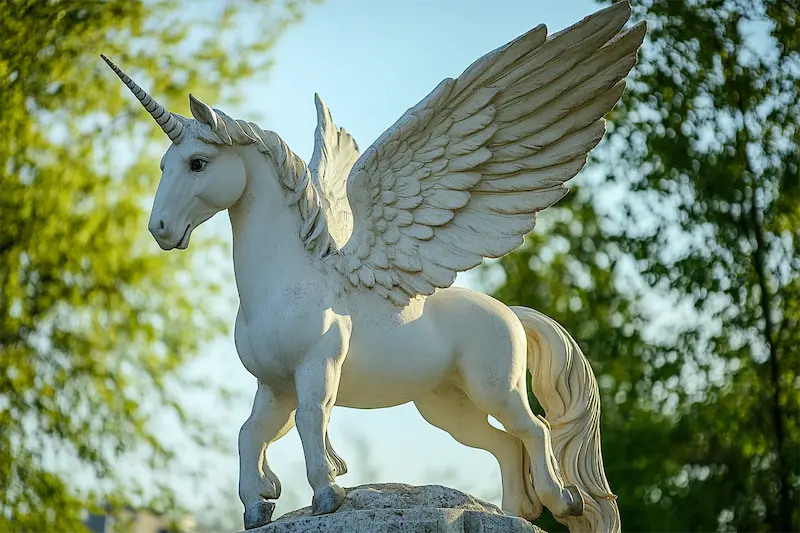- 1 Introduction to Pegasus
- 2 Appearance and Characteristics of Pegasus
- 3 Origins and Symbolic Meaning of Pegasus
- 4 Powers and Abilities of Pegasus
- 5 Famous Myths and Legends About Pegasus
- 6 The Influence of Pegasus in Modern Culture
- 7 Similar or Opposing Mythical Creatures
- 8 Pegasus in Feng Shui
- 9 Conclusion
Introduction to Pegasus
Pegasus is one of the most famous and iconic mythical creatures in ancient Greek mythology. Often portrayed as a pure white horse with large, angelic wings, Pegasus is not only a symbol of freedom and soaring beyond limits, but also represents intelligence, poetic inspiration, and nobility beyond the reach of ordinary mortals.
Pegasus first appeared in Greek legends as the offspring born from the blood of Medusa when the hero Perseus beheaded her. From then on, Pegasus became a loyal companion to many heroes, revered by the gods, and immortalized in the sky as the constellation Pegasus.
Appearance and Characteristics of Pegasus
Legendary Appearance
Pegasus is described as a majestic stallion with a flawless white body and enormous wings sprouting from its back. It possesses the power to fly across the highest skies, through storms, and over vast oceans. The radiant light emitted by Pegasus makes it appear angelic, commanding respect from even other mythical creatures.
Distinctive Traits
More than just a winged horse, Pegasus is deeply associated with endless poetic inspiration. Myths tell that wherever Pegasus strikes its hoof, a magical spring called Hippocrene would emerge—known as the fountain of poetry, providing inspiration to poets, musicians, and philosophers.
Pegasus also embodies pride, bravery, and rare loyalty. It only serves those deemed truly worthy—those with pure hearts and noble purposes.
Origins and Symbolic Meaning of Pegasus
Mythological Origins
According to Greek mythology, Pegasus was born from the blood of the Gorgon Medusa after she was slain by Perseus. Some versions also mention that Pegasus and his twin brother, Chrysaor, were born from the union of Medusa’s blood and Poseidon, who once transformed into a horse to seduce her.
From birth, Pegasus was a divine creature closely tied to the gods of Olympus. It aided the hero Bellerophon in slaying the Chimera and accomplished many legendary feats in ancient Greek history.
Symbolic Meaning
Pegasus is a symbol of freedom and the ability to transcend mortal limits to reach new heights, both physically and spiritually. Its wings are not just tools for flight, but also a metaphor for intellectual liberation and boundless creativity.
For artists, poets, and philosophers, Pegasus serves as an eternal metaphor for poetic inspiration and the pursuit of ideas unrestrained by harsh realities.
Powers and Abilities of Pegasus
Physical Strength
Pegasus possesses extraordinary powers far surpassing that of ordinary horses. It can fly at speeds faster than the wind, cross towering mountains, and glide over endless seas without tiring. Its strength is enough to pull a divine chariot or carry heroes and gods into fierce battles.
Symbolic Powers
Beyond physical might, Pegasus represents the source of endless inspiration. The Hippocrene spring it created has become an immortal symbol of poetry and art. Pegasus’s wings embody the yearning to break free, overcome obstacles, and reach new intellectual horizons.
Pegasus can also sense the true nature of those who approach it. Only individuals with noble hearts, courage, and goals that serve the greater good are accepted by Pegasus as worthy companions.
Famous Myths and Legends About Pegasus
Bellerophon and the Chimera
One of the most famous tales of Pegasus is its partnership with the hero Bellerophon in the battle against the Chimera—a fearsome creature with the head of a lion, the body of a goat, and the tail of a serpent. With Pegasus’s help, Bellerophon was able to fight from the sky and slay the Chimera from a safe distance, earning eternal glory in Greek mythology.
Pegasus and Zeus
After the battle with the Chimera, Pegasus flew to Mount Olympus, where it was welcomed by Zeus and became his celestial steed, pulling the god’s thunder chariot. Pegasus was immortalized in the sky as the Pegasus constellation, which is still visible today.
The Fountain of Hippocrene
Legend says that when Pegasus struck Mount Helicon with its hoof, the Hippocrene spring burst forth, becoming an everlasting source of poetic inspiration. This sacred site became a haven for poets seeking divine inspiration from its magical waters.
The Influence of Pegasus in Modern Culture
Art, Literature, and Cinema
In modern culture, Pegasus continues to be a widely recognized symbol of freedom, creativity, and intellect. In literature, Pegasus is a metaphor for soaring inspiration. In cinema, Pegasus appears in many iconic works, such as Clash of the Titans, Percy Jackson, and various role-playing games.
Branding Symbolism
Pegasus also inspires many famous global brand logos, especially in aviation, media, and education industries, symbolizing strength, speed, creativity, and pioneering spirit.
Similar or Opposing Mythical Creatures
Similar Creatures
Pegasus shares similarities with the Unicorn—both Western mythical horses representing purity. However, while the Unicorn symbolizes innocence, Pegasus represents freedom and aspiration.
Opposing Creatures
In contrast, Pegasus embodies the desire to rise and transcend, whereas creatures like the Basilisk or Chimera symbolize chaos, obstacles, and darkness.
Pegasus in Feng Shui
Although Pegasus originates from Western mythology, its imagery has been widely adopted in modern feng shui as a symbol of strong energy, inspiration, and positive luck. It is believed to stimulate creative thinking, unlock mental blockages, and support career advancement.
Placing a Pegasus figure in workspaces, creative studios, or study rooms is thought to boost intelligence, spark new ideas, and help individuals break invisible barriers in life and career.
Conclusion
Pegasus is one of the greatest mythical creatures in human history—not only for its pure beauty and majestic wings but also for the profound spiritual values it represents. As an eternal symbol of freedom, creativity, wisdom, and relentless aspiration, Pegasus continues to live on in human imagination, serving as a source of endless inspiration to overcome challenges, discover oneself, and conquer new heights.
